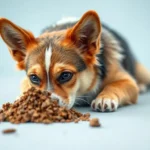
Introduction
Proper nutrition is a cornerstone of health for all dogs, particularly for puppies who are in critical stages of growth and development. For Pitbull puppies, ensuring they receive the right nutrients is essential, especially when weight gain becomes a concern. Pitbulls are muscular and energetic dogs, so a balanced diet that promotes healthy weight gain is crucial for their overall well-being. In this article, we will explore the best dog foods for pitbull puppies to gain weight, offering insights into their nutritional needs, signs of underweight conditions, and practical feeding tips.
Understanding Dog Nutrition
The Basics of Canine Nutrition
Canine nutrition primarily revolves around three macronutrients: proteins, fats, and carbohydrates.
- Proteins are vital for muscle development and repair, making them essential for growing puppies.
- Fats provide a concentrated source of energy and help with the absorption of fat-soluble vitamins.
- Carbohydrates serve as a source of energy and aid in digestive health.
In addition to these macronutrients, micronutrients such as vitamins and minerals play a critical role in supporting various bodily functions. These nutrients help in the development of bones, teeth, and the immune system.
Lastly, water is often overlooked but is crucial for digestion, nutrient transportation, and temperature regulation. Puppies should always have access to fresh water.
Nutritional Needs of Pitbull Puppies
Pitbull puppies have unique dietary requirements compared to other breeds due to their muscular build and high energy levels. Factors such as age, weight, and activity level significantly influence their nutritional needs. Generally, puppies need more calories than adult dogs to support their rapid growth.
For Pitbull puppies, calorie-dense foods are particularly important for weight gain. These foods often contain higher levels of protein and fat, which can help achieve a healthy weight while promoting muscle development.
Signs Your Pitbull Puppy Needs to Gain Weight
Identifying Underweight Puppies
Recognizing whether your Pitbull puppy is underweight is the first step in addressing their nutritional needs. Some physical signs of being underweight include:
- Ribs and spine being easily visible.
- A pronounced waistline.
- Lack of muscle definition.
Behavioral indicators can also reveal weight issues. For instance, lethargy or low energy levels may suggest that your puppy is not getting enough calories.
Health Risks of Being Underweight
Being underweight can lead to various health issues, including weakened immune function, delayed growth, and increased susceptibility to illness. Addressing weight concerns early is vital to prevent long-term consequences for your puppy’s health.
Best Dog Foods for Pitbull Puppies to Gain Weight
Top Nutritional Choices
When selecting the best dog foods for pitbull puppies to gain weight, look for high-calorie options specifically formulated for puppies. Here are some recommended brands and products that excel in nutritional value:
- Blue Buffalo Life Protection Formula: This food is rich in protein from real meat and contains wholesome grains, fruits, and vegetables.
- Diamond Naturals Large Breed Puppy: With high protein content and added DHA for brain development, this formula supports healthy growth.
- Merrick Grain-Free Puppy Food: Known for its high protein and fat content, this dog food is perfect for promoting weight gain in active puppies.
Always check the ingredient list to ensure that the food is rich in high-quality protein sources and healthy fats.
Homemade Diet Options
While commercial dog foods are convenient, homemade diets can also be effective for weight gain. However, it’s essential to balance the ingredients to ensure your puppy receives all necessary nutrients.
Suggested Recipes:
- Chicken and Rice:
- Cooked chicken (deboned)
- Brown rice
-
Steamed carrots
-
Beef and Sweet Potato:
- Ground beef
- Mashed sweet potatoes
- Peas
Both of these recipes can be modified to suit your puppy’s taste preferences, but consult with a veterinarian to ensure they meet your puppy’s nutritional needs.
Commercial vs. Homemade Diets
Each feeding option has its pros and cons. Commercial dog foods are convenient and formulated to meet canine nutritional requirements, but they can vary in quality. Homemade diets allow for better control over ingredients but require more time and knowledge to balance properly.
When deciding on a diet, consider your lifestyle, budget, and the time you can commit to meal preparation.
Tips for Feeding Your Pitbull Puppy
Establishing a Feeding Routine
Consistency is key when feeding your Pitbull puppy. Establishing regular feeding times helps regulate their digestion and metabolism. Puppies typically require three to four meals a day, which can be gradually reduced to two meals as they mature.
Portion Control and Feeding Guidelines
Determining the appropriate portion sizes for weight gain is essential. Use feeding charts based on your puppy’s weight and age to guide you. Many premium dog foods provide specific serving sizes on their packaging, which can help you avoid over- or under-feeding.
Monitoring Weight Gain
Keep track of your puppy’s weight gain by weighing them regularly. Adjust their diet based on their growth progress. If they are not gaining weight as expected, consider increasing their food intake or consulting a veterinarian for tailored advice.
Common Mistakes to Avoid
Overfeeding and Its Consequences
While it may be tempting to increase food portions, overfeeding can lead to obesity and associated health issues like joint problems and heart disease. Watch for signs of obesity, including difficulty in breathing, lack of energy, and visible fat deposits.
Choosing Low-Quality Foods
Low-quality ingredients can hinder your puppy’s growth and overall health. When selecting dog food, be cautious of fillers and artificial additives. Familiarize yourself with how to read dog food labels to ensure you’re making informed choices.
Neglecting Regular Vet Check-ups
Routine veterinary visits are crucial for monitoring your puppy’s health and nutrition. Regular check-ups can help detect any underlying issues related to diet or growth, ensuring your puppy remains healthy and happy.
Additional Considerations
Supplements for Weight Gain
In some cases, you may consider using supplements to aid in weight gain. Look for high-quality protein powders or fatty acid supplements that are specifically formulated for dogs. Always consult your veterinarian before introducing any new supplements to your puppy’s diet.
Special Dietary Needs
Some Pitbulls may have food allergies or sensitivities that necessitate a special diet. If your puppy exhibits signs of allergies, such as itching or gastrointestinal upset, consult your veterinarian for tailored dietary recommendations.
The Role of Exercise
While exercise is essential for overall health, it can also impact weight gain. Engaging in balanced exercise helps maintain muscle mass and prevents obesity. Suitable activities for Pitbull puppies include supervised playtime, short walks, and basic obedience training.
Conclusion
In summary, proper nutrition is vital for the healthy growth and development of Pitbull puppies. By choosing the best dog foods for pitbull puppies to gain weight, you can ensure that your furry friend thrives. Prioritizing their nutritional needs through well-balanced diets and regular veterinary care will set the foundation for a strong, healthy adult dog. Remember, informed choices today will lead to a healthier tomorrow for your Pitbull puppy.









